
Nitheesh NH
What’s the Story?
Gift giving is deeply rooted in the essence of human interactions. There are numerous gifting occasions year-round, extending to both personal gifting and corporate gifting. The latter has undergone a transformation over the past year, since the outbreak of Covid-19 led most businesses to reshuffle the way they operate and made remote working a common practice. More flexible working arrangements has had multiple implications for corporate gifting, as restricted interactions between colleagues and with prospects/clients have given rise to challenges in establishing or maintaining relationships. On the other hand, opportunities such as digital conferences and events have opened new avenues for relationship building, such as through gift giving. On a holistic level, it appears that gifting has substantially increased in importance—and online gifting even more so: Global searches for “online gift” increased by 80% year over year in the 12 weeks ended in August 2020—a period during which most companies resorted to working from home—according to Google. Our research indicates that the corporate gifting market is growing faster than the personal gifting market. However, it may not be as easy to win in corporate gifting, as it can be very challenging for business gift buyers to align company policies on gifting while finding a gift that makes the recipient feel valued. In this report, sponsored by GiftNow, we analyze the findings of a May 2021 Coresight Research survey of 300 corporate gift buyers in the US; respondents were from across industries such as retail, real estate, manufacturing, travel, hospitality and health services, among others. We asked respondents about the criteria they consider when purchasing corporate gifts, as well as the advantages, key occasions and types of products involved in gift giving. We also discuss the impact of the Covid-19 pandemic on corporate gifting frequency and how it may change in the coming years.Why It Matters
The corporate gifting market is a big opportunity for retailers and gifting platforms. We estimate that the US corporate gifting market will reach $242 billion by the end of this year and $306 billion by 2024, growing at a CAGR of 8.1%. Figure 1. US Corporate Gifting Market, 2019–2024E (USD Bil.) [caption id="attachment_129174" align="aligncenter" width="700"]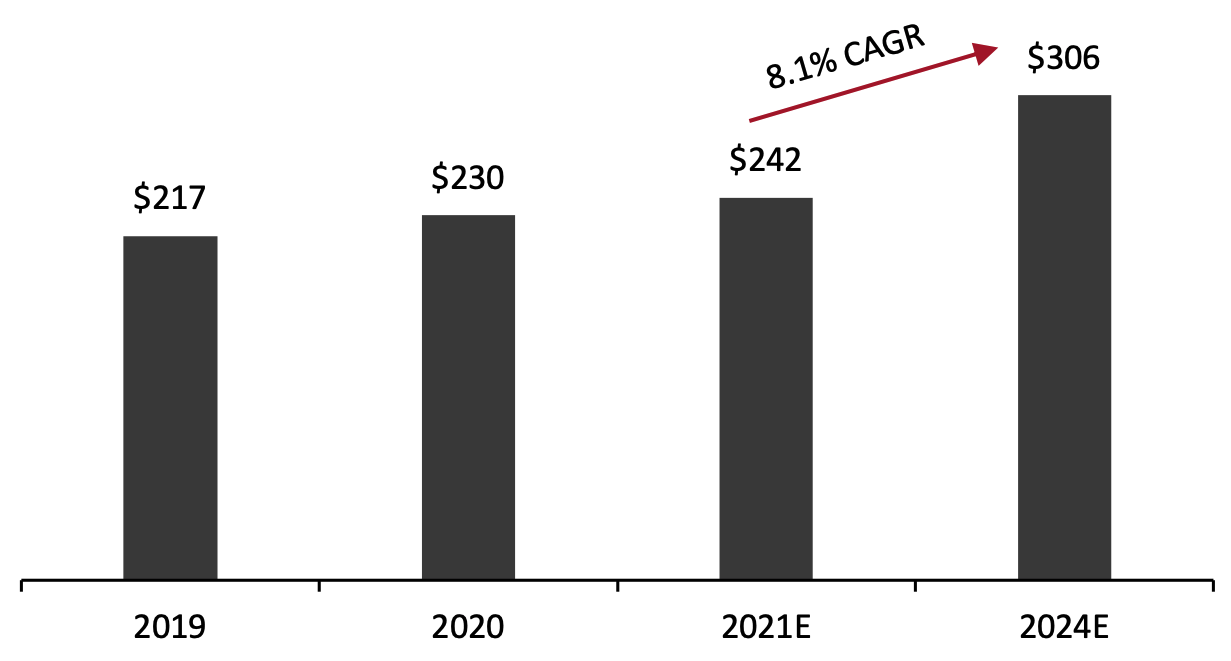 Source: Coresight Research[/caption]
The corporate gifting market is both large and growing—there are two key areas that we believe will be crucial in determining success in corporate gifting:
Source: Coresight Research[/caption]
The corporate gifting market is both large and growing—there are two key areas that we believe will be crucial in determining success in corporate gifting:
- We estimate that external corporate gifting will comprise around 60% of the overall corporate gifting market in 2021, totaling just over $140 billion.
- Our survey data reveals that gift cards are the most purchased type of gift. We estimate that gift cards will account for around 37% of the overall corporate gifting market in 2021, totaling $89.5 billion.
US Corporate Gifting Market: Unwrapping the Opportunity
Based on our market size estimates above, the US corporate gifting market offers an estimated $64 billion in incremental opportunity until 2024. Furthermore, our survey revealed that the Covid-19 pandemic has fueled the growing corporate gifting sector, with around 35% of gift givers gifting more than usual and nearly just over seven in 10 respondents expect to retain the same, or increase, gifting frequency after the pandemic ceases—findings which we discuss later in this report. We summarize six key trends in the US corporate gifting market in Figure 2 and explore each in detail below, leveraging findings from our proprietary survey. Figure 2. Key Corporate Gifting Trends in the US [caption id="attachment_129175" align="aligncenter" width="700"]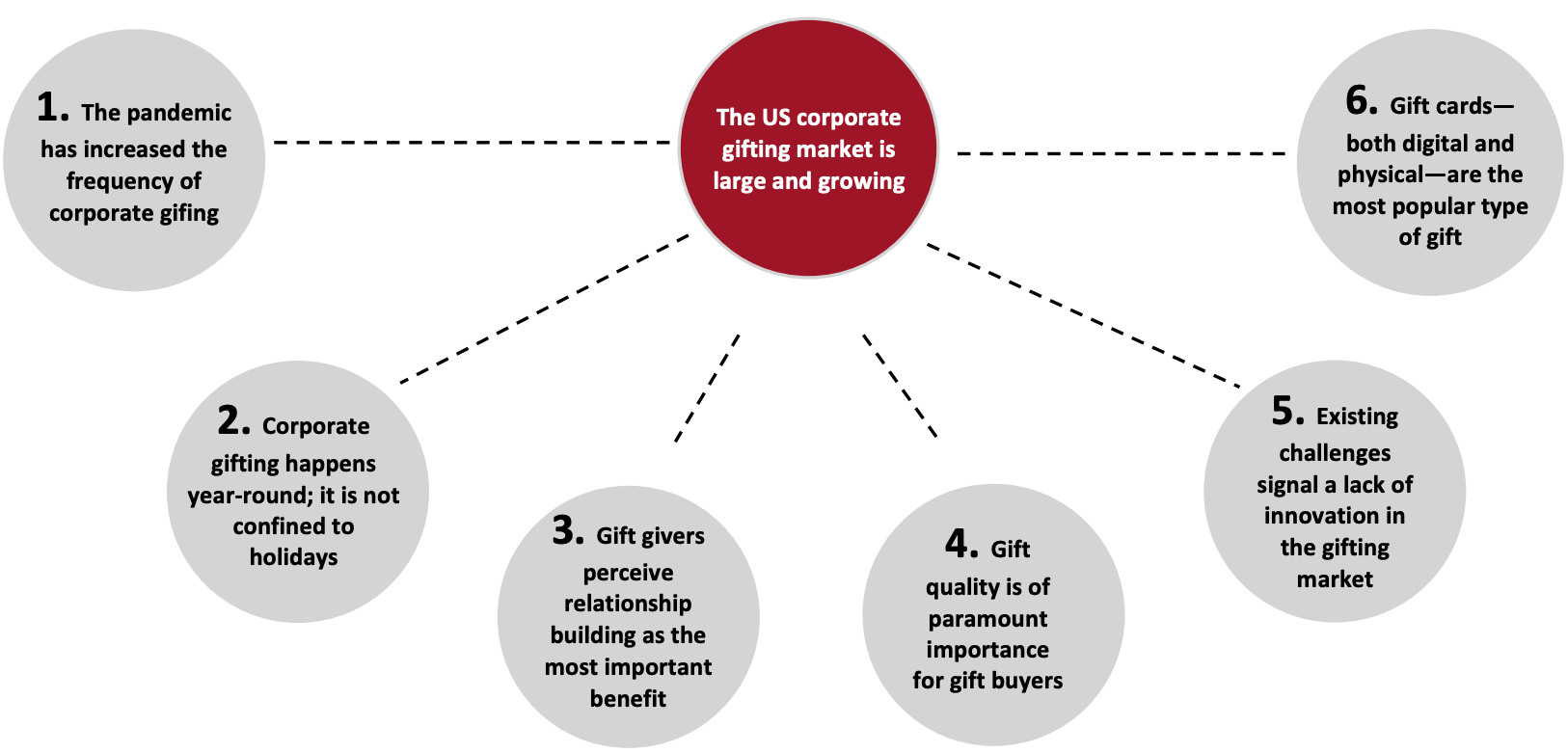 Source: Coresight Research[/caption]
1. Corporate Gifting Frequency Is On the Rise
With pandemic-induced hybrid working models emerging, many employees have switched to working from home—in some cases permanently. In addition, traditional holiday parties, dinners and outdoor corporate activities have been substantially reduced. In turn, these trends have led to an increase in corporate gifting frequency, which is often viewed as a substitute to the aforementioned activities. This trend is being observed by most gifting platforms. For example, in a November 2020 interview with CO, an editorial website owned by the US Chamber of Commerce, the CEO of a Texas-based gifting platform said, “We really saw companies double down—both in terms of reaching out to clients and really thanking their employees. What I am seeing is this feeling of wanting to feel connected.”
Reflecting this, the corporate gift givers we surveyed believe that the frequency of corporate gifting has changed since remote working became embedded in company practices:
Source: Coresight Research[/caption]
1. Corporate Gifting Frequency Is On the Rise
With pandemic-induced hybrid working models emerging, many employees have switched to working from home—in some cases permanently. In addition, traditional holiday parties, dinners and outdoor corporate activities have been substantially reduced. In turn, these trends have led to an increase in corporate gifting frequency, which is often viewed as a substitute to the aforementioned activities. This trend is being observed by most gifting platforms. For example, in a November 2020 interview with CO, an editorial website owned by the US Chamber of Commerce, the CEO of a Texas-based gifting platform said, “We really saw companies double down—both in terms of reaching out to clients and really thanking their employees. What I am seeing is this feeling of wanting to feel connected.”
Reflecting this, the corporate gift givers we surveyed believe that the frequency of corporate gifting has changed since remote working became embedded in company practices:
- Almost six in 10 respondents either gifted the same or more in the past 12 months than they did prior to remote working. The proportions that reported this were highest among industrial/manufacturing sector respondents (72%), followed by the IT sector (64%).
- Of those gifting more than usual, two-thirds of respondents cited keeping employees motivated as a reason for increased gifting. This was followed by staying connected with clients/prospects (59%) and new gifting opportunities such as digital conferences (49%).
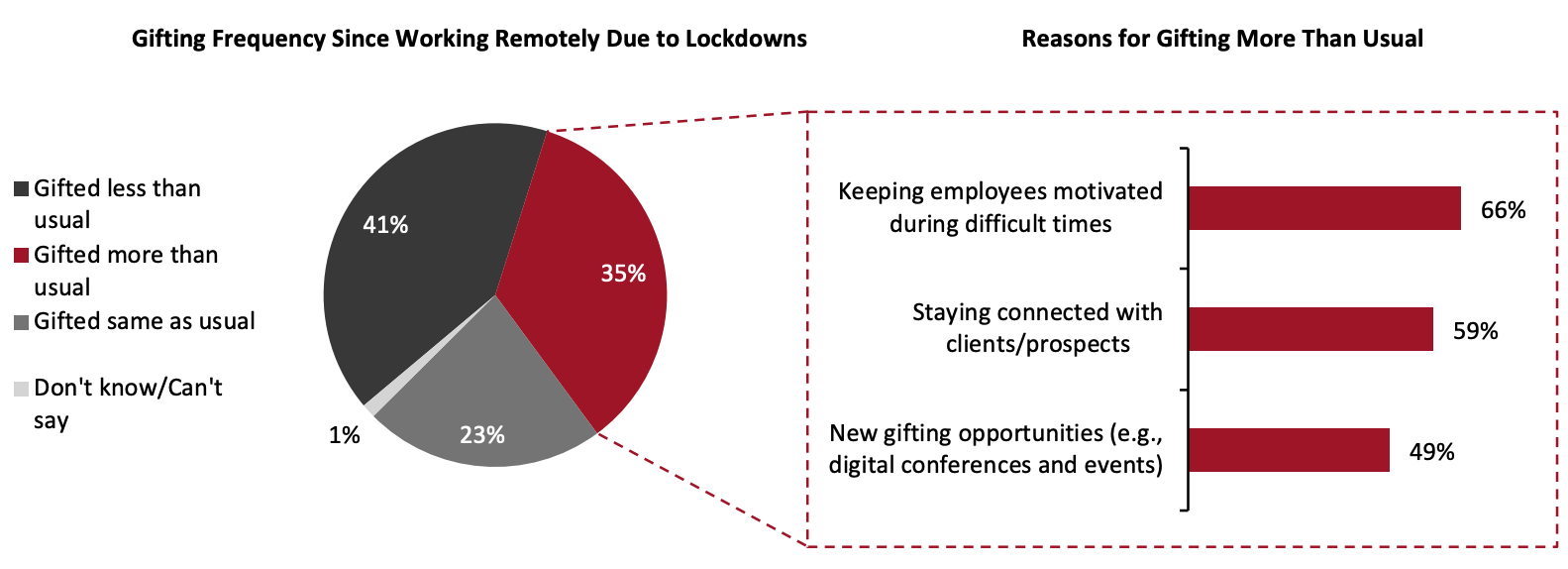 Base: 300 corporate gift givers in the US, surveyed in May 2021
Base: 300 corporate gift givers in the US, surveyed in May 2021Source: Coresight Research[/caption] Remote working has increased the need for staying connected, in turn increasing the relevance of corporate gifting. There are also other positive contributing factors in place—cost savings on utilities such as electricity and other overhead expenses, for example. These cost reductions have translated to an increase in corporate gifting budgets for some companies—more than half of all respondents cited an enhanced corporate gifting budget due to Covid-19. Figure 4. Impact of Covid-19 on Corporate Gifting Budgets (% of Respondents) [caption id="attachment_129177" align="aligncenter" width="700"]
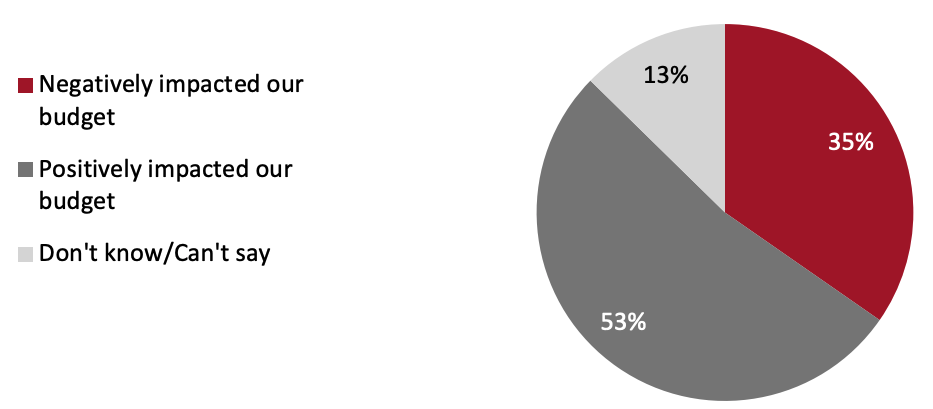 Base: 300 corporate gift givers in the US, surveyed in May 2021
Base: 300 corporate gift givers in the US, surveyed in May 2021Source: Coresight Research[/caption] 2. Corporate Gifting Happens Year-Round Corporate gifting is not just confined to the holidays—in order to stand out, businesses must leverage every occasion for corporate gift giving, leaving a lasting impression on the recipient. We asked respondents about the key events/reasons for sending corporate gifts and found the following:
- Corporate gift giving is not confined to any one part of the year. Just under two-thirds of respondents cited giving corporate gifts to appreciate an employee or for celebrating a milestone—a higher proportion than reported that they gave gifts for the holidays.
- Holidays were the second most popular corporate gifting occasion, cited by more than half of respondents.
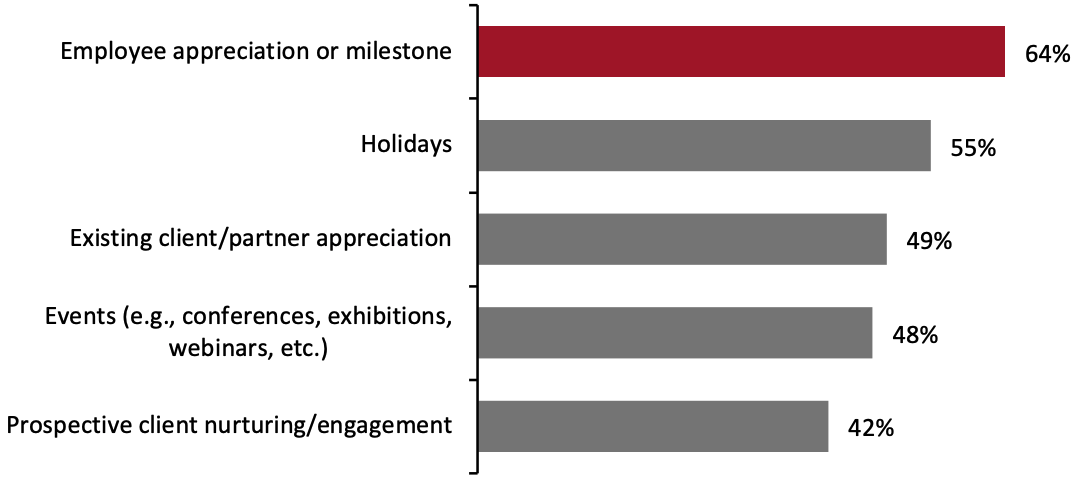 Base: 300 corporate gift givers in the US, surveyed in May 2021
Base: 300 corporate gift givers in the US, surveyed in May 2021Source: Coresight Research[/caption] We believe that there are two key reasons for corporate gifting outside of the holidays:
- Effectiveness of these gifts, as they carry an element of surprise and make the recipient feel more valued than traditional holiday gifts, which usually have very limited differentiation
- The year-round nature of occasions such as employee milestones and events, which contribute significantly to overall corporate gifting
- Overall, 61% of respondents cited sending one-to-one corporate gifts two to five times in the past 12 months. This frequency was highest within the media and entertainment industry (75%), closely followed by the education industry (72%).
- Slightly fewer respondents cited sending one-to-many corporate gifts at the same frequency in the past 12 months. Sending one-to-many gifts two to five times a month is most prevalent in the IT industry (65%), followed by the media and entertainment industry (62%).
- Over one-quarter of respondents for both one-to-one and one-to-many corporate gifting reported that they gifted more than six times in the past 12 months.
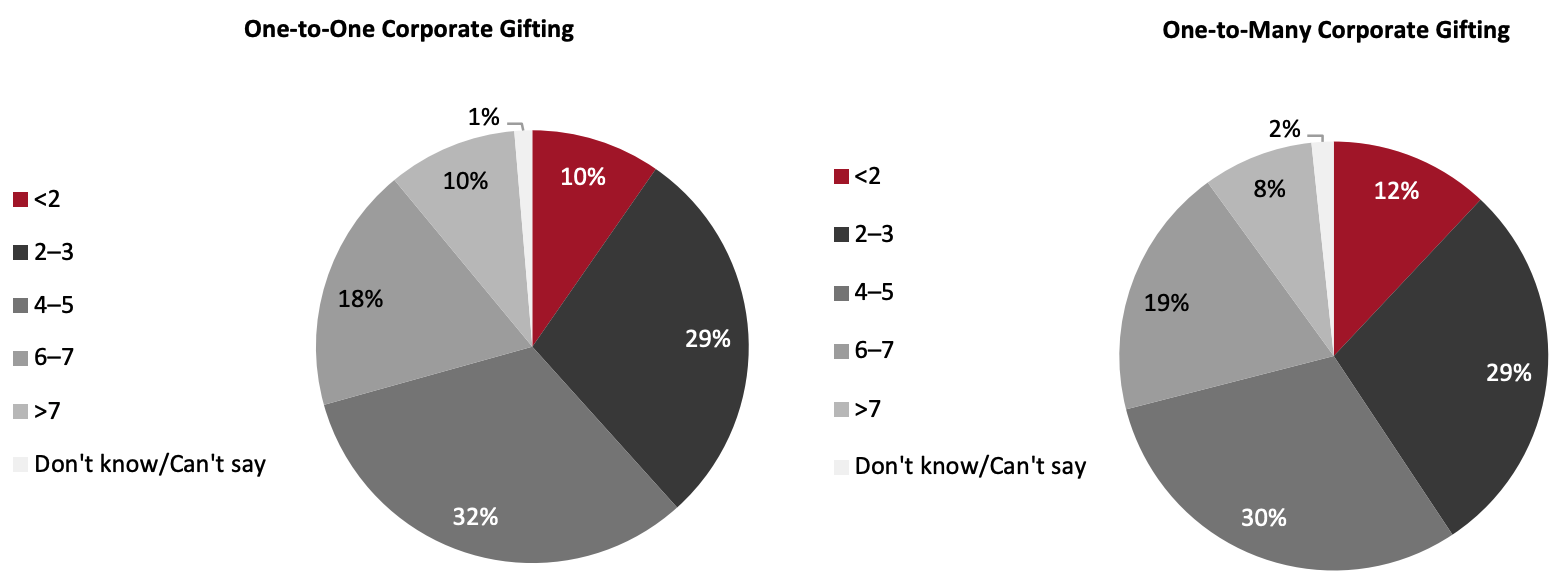 Base: 300 corporate gift givers in the US, surveyed in May 2021
Base: 300 corporate gift givers in the US, surveyed in May 2021Source: Coresight Research[/caption] 3. The Essence of Corporate Gifting Lies in Relationship Building Corporate gifting is an important tool to strengthen relationships and make the recipient feel valued. Even though there are direct monetary benefits of corporate gifting, such as lead generation and improved sales, these are overshadowed by emotional and sentimental benefits. The ultimate goal of most corporate gifts is reaping financial gains in the medium to long term, and this is achieved by the gift givers establishing lasting relationships with recipients. We believe that excessive focus on lead generation and prospecting can take away from the true essence of the gift and it may lose its relevance as it becomes transactional than emotional. This is reflected in the top three corporate gifting advantages, as cited by our survey respondents:
- Improved relationship with customers/employees—Some 43% of respondents ranked improved relationships as among the top three advantages of corporate gifting, with 15% of those citing it as the topmost advantage. By industry, more than half of the education sector respondents (52%) cited it among the top three advantages, closely followed by the IT sector (51%).
- Making the recipient feel valued—Some 38% of respondents ranked this advantage as among the top three, with 14% of respondents citing it as the topmost advantage. In addition, nearly four in 10 respondents from the health services sector cited it as the top advantage—by far the largest proportion from any sector.
- Improved employee productivity—Just under four in 10 respondents ranked employee productivity among the top three advantages of corporate gifting. Almost half of respondents from the manufacturing sector ranked it among the top three advantages—the highest proportion from any sector.
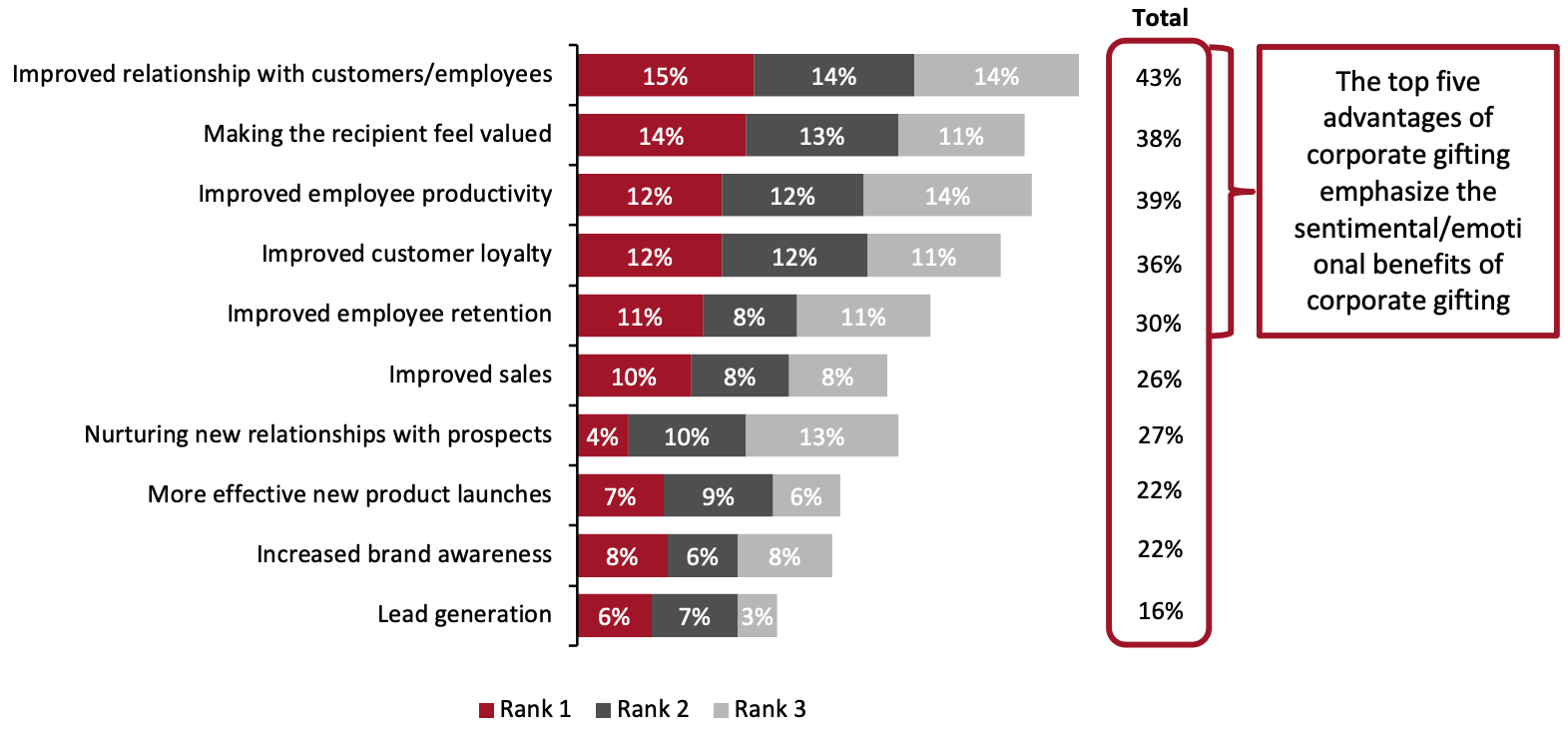 The ordering of advantages is based on the weighted average of all responses, where “Rank 1” carries the highest weight
The ordering of advantages is based on the weighted average of all responses, where “Rank 1” carries the highest weightBase: 300 corporate gift givers in the US, surveyed in May 2021
Source: Coresight Research[/caption] Our survey data also suggest a strong correlation between perceived advantages from corporate gifting and the benefits reaped by corporate gift givers, as we summarize in Figure 8. The top five advantages and benefits are the same—implying that corporate gifting is not very different from personal gifting, and the gift givers have similar objectives of relationship building and making the recipient feel valued.
- Overall, 96% of respondents cited benefits of improving relationships with their customers/employees. Almost half of respondents “benefited substantially” in relationship building through corporate gifting.
- Making the recipient feel valued emerged as the second-most important benefit of corporate gifting. Some 45% of respondents “benefitted substantially” in this area through corporate gifting.
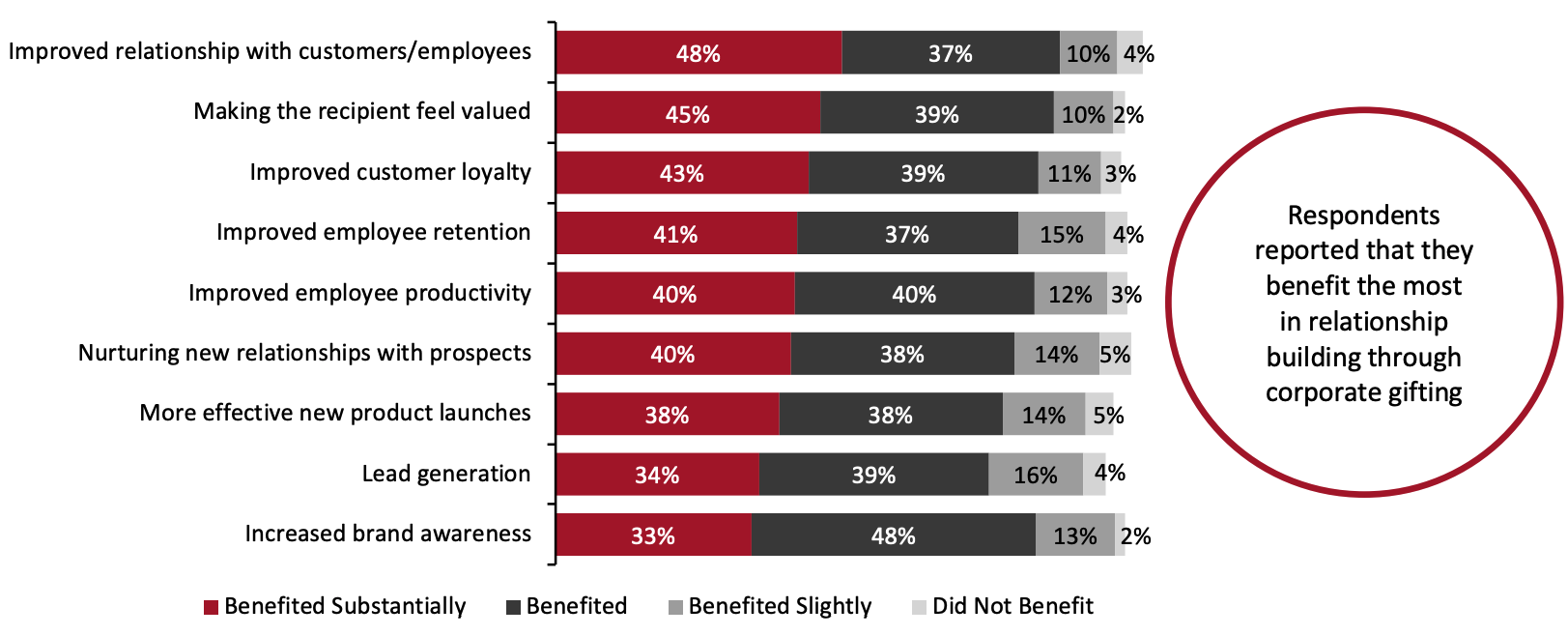 The ordering of benefits is by descending order of the proportion of respondents who selected “Benefited Substantially”
The ordering of benefits is by descending order of the proportion of respondents who selected “Benefited Substantially”The totals do not equal 100% because respondents citing “Don’t know/Can’t say” are not included
Base: 300 corporate gift givers in the US, surveyed in May 2021
Source: Coresight Research[/caption] 4. What Gift Givers Look for When Purchasing Gifts: Quality and Variety When purchasing corporate gifts, gift givers take into account the perceived benefits from the recipient’s point of view. In addition, when purchasing gifts to strengthen relationships, gift buyers must refrain from buying poor-quality products with low durability. Our survey found the following:
- The quality of the product is the topmost criterion for corporate gift buyers. Some 62% of respondents cited product quality “extremely important,” while 26% cited it “very important.”
- Timely delivery of the gift to the recipient emerged as the second-most important criterion for corporate gift buyers, cited by 47% of respondents as “extremely important” and by 35% as “very important.”
- Some 39% of respondents cited the variety of gifts available as “extremely important,” while 42% cited it as “very important.”
- Simplicity of the overall process ranked fourth among criteria that gift buyers look for when purchasing corporate gifts. The top three criteria discussed above can add to the complexity of corporate gifting. It is imperative for retailers and gifting platforms to simplify the overall buying process. Almost eight in 10 respondents cited a simple buying process as “extremely important” or “very important.”
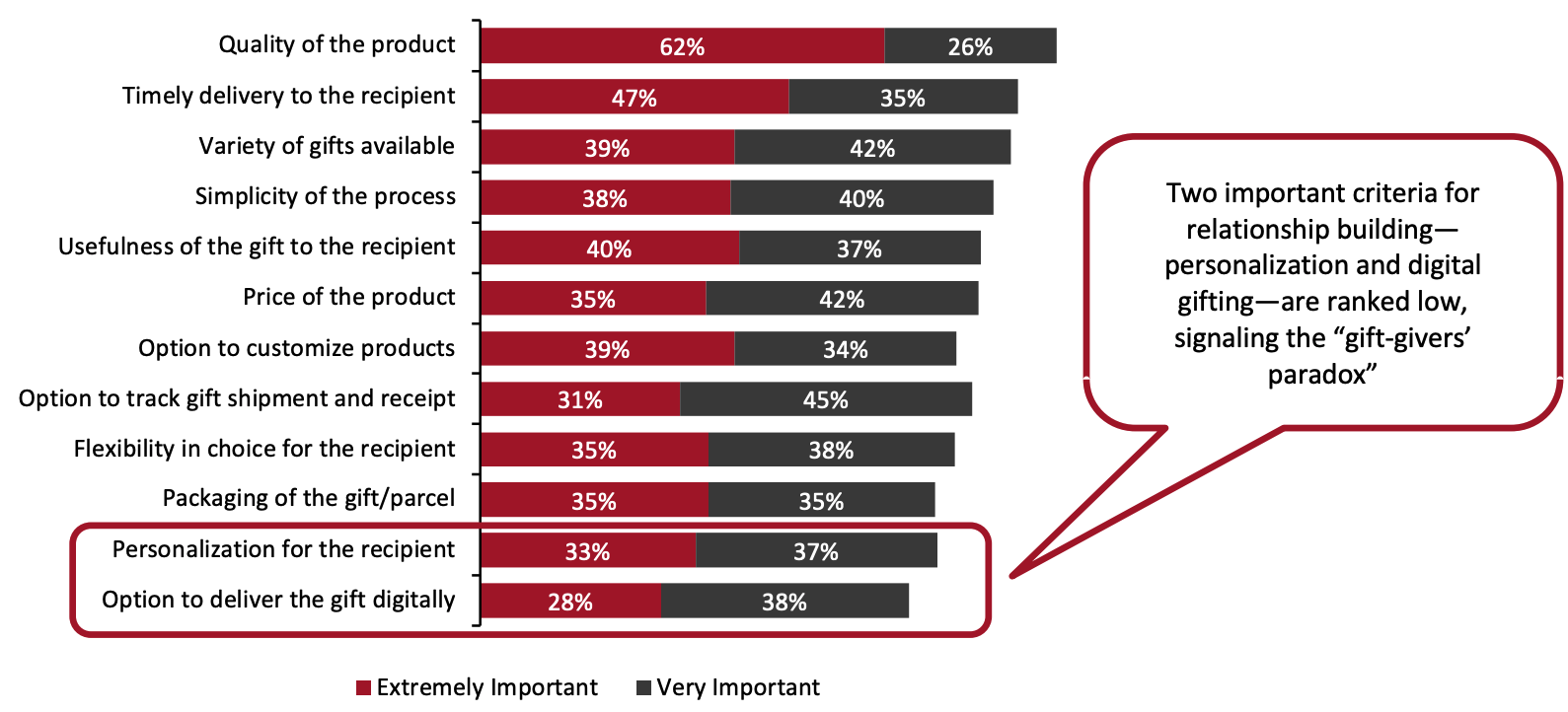 The ordering of criteria is based on the weighted average of all the responses, where “Extremely Important” carries the highest weight
The ordering of criteria is based on the weighted average of all the responses, where “Extremely Important” carries the highest weightBase: 300 corporate gift givers in the US, surveyed in May 2021
Source: Coresight Research[/caption] Additionally, in a separate question, we asked corporate gift givers about the amount spent on corporate gifts on a per-unit basis and found the following:
- The majority of respondents cited spending between $25 and $125 on corporate gifts. Around 77% of respondents spend within this range for one-to-one corporate gifting, while 71% of respondents cited spend in this range for one-to-many corporate gifts.
- Spending per gift peaks between $75 and $100, and this is more prominent for one-to-one corporate gifting—some 25% of respondents spend within this range. This can be attributed to gift givers putting in more thought when buying a corporate gift for an individual versus for a group of people.
Figure 10. Amount Spent on Corporate Gifts on a Per Unit Basis (% of Respondents)
[caption id="attachment_129223" align="aligncenter" width="700"]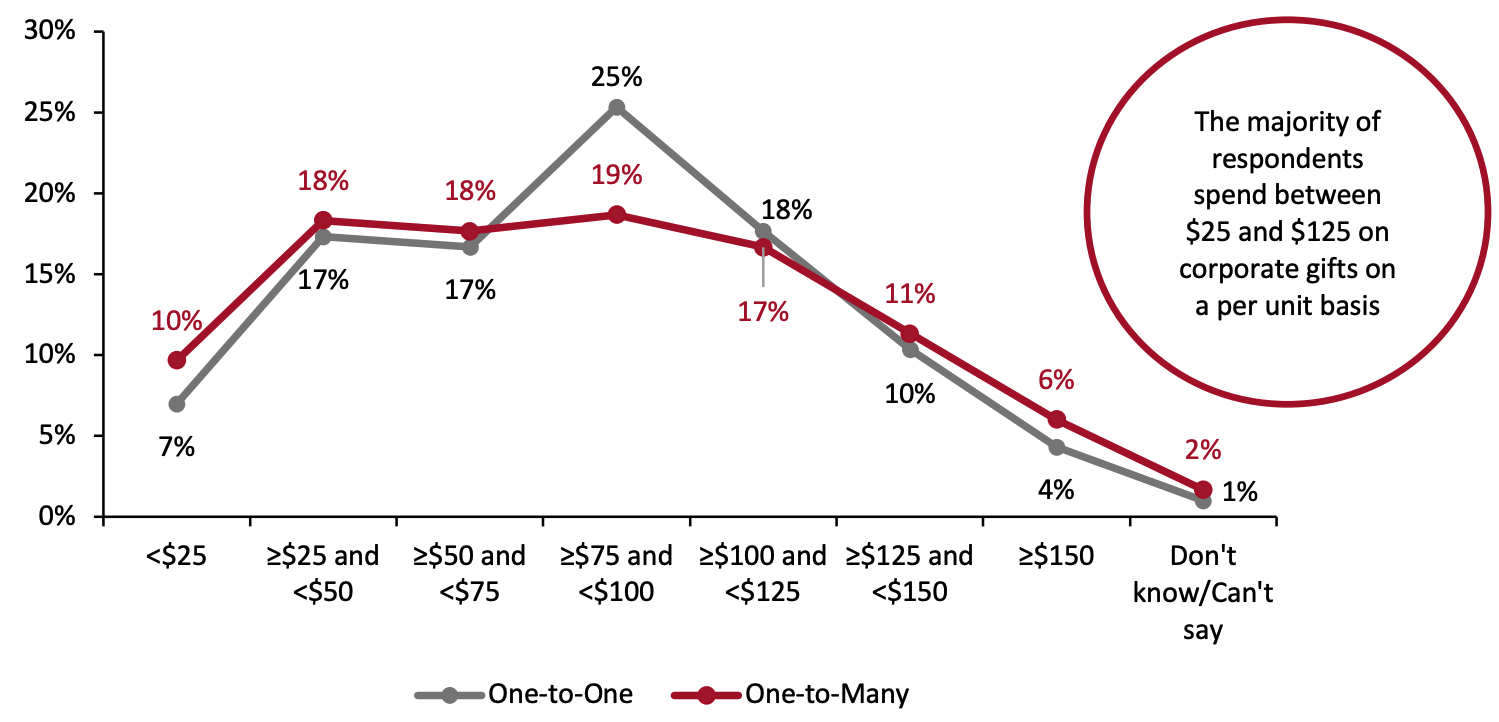 Base: 300 corporate gift givers in the US, surveyed in May 2021
Base: 300 corporate gift givers in the US, surveyed in May 2021Source: Coresight Research[/caption] 5. Key Challenges Facing Gift Buyers: A Lack of Innovation in the Industry Purchasing a corporate gift can be quite challenging. Most challenges arise due to the very nature of corporate gifts—they are given to recipients who gift givers know professionally but not necessarily personally. The gift buyer must ensure that the gift is appropriate according to the formality of the relationship and yet make the gifting a memorable experience for the recipient. Our survey revealed three primary challenges in corporate gifting:
- Limited information about the recipient’s preferences emerged as the topmost challenge in corporate gifting. Some 91% of respondents cited it as either “very challenging/challenging” or “slightly challenging.”
- Restrictive company policies were found to be the second biggest challenge in corporate gifting, with 85% of respondents citing it as either “very challenging/challenging” or “slightly challenging.” We believe this to be a two-pronged challenge. For example, some companies restrict their employees from receiving corporate gifts from external clients while others have budget restrictions on corporate gifting.
- A limited range of products emerged as the third biggest challenge in corporate gifting. Around 86% of the respondents cited it as either “very challenging/challenging” or “slightly challenging.”
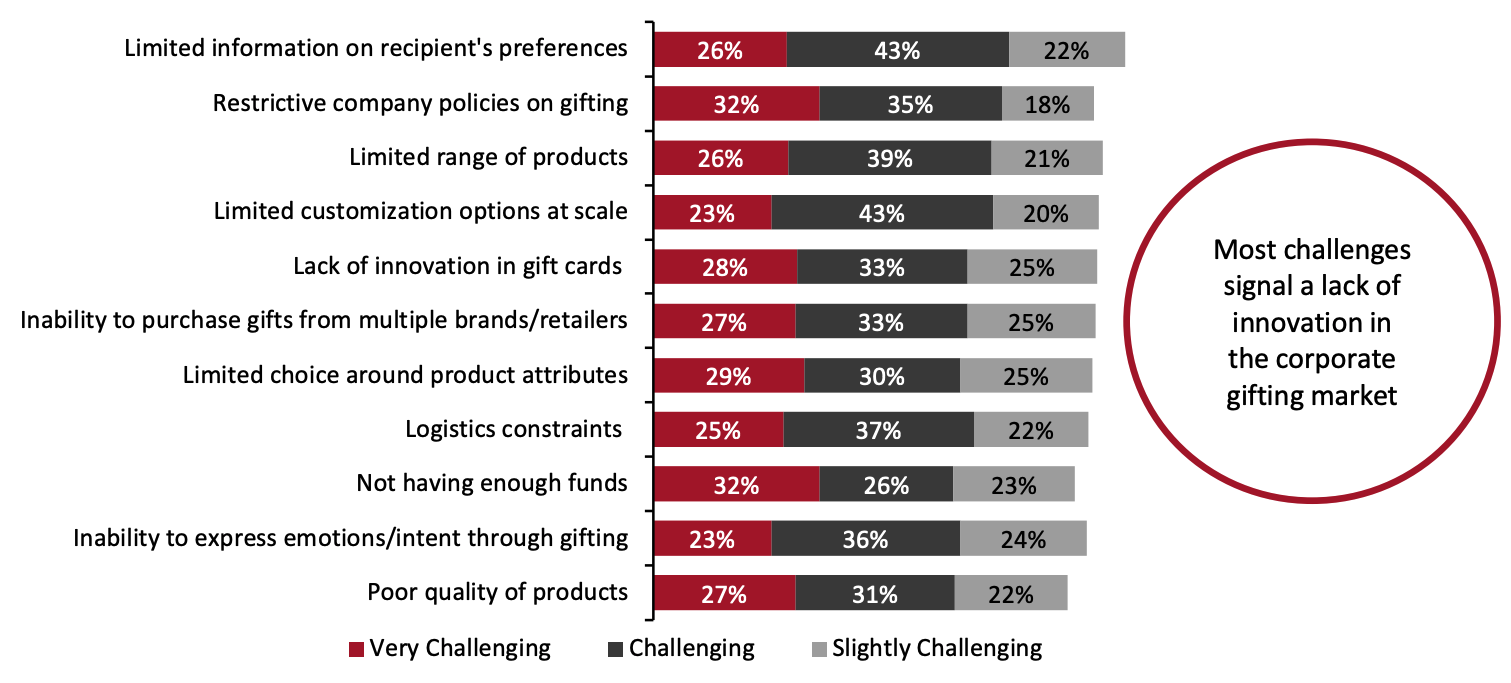 The ordering of challenges is based on the weighted average of all responses, where “very challenging” carries the highest weight
The ordering of challenges is based on the weighted average of all responses, where “very challenging” carries the highest weightBase: 300 corporate gift givers in the US, surveyed in May 2021
Source: Coresight Research[/caption] 6. Gifting Categories: Gift Cards Lead the Pack We believe that gift cards have the potential to solve some of the key corporate gifting challenges facing gift buyers. As discussed in the previous section, challenges such as limited information about recipients’ preferences and a limited range of products can make the gifting process highly cumbersome. In this context, gift cards can help gift buyers simplify the overall process. In addition, gift cards are also one of the most anticipated gifts by recipients. In fact, 54% of overall consumers wanted to receive gift cards for holiday 2020—the topmost preferred category—according to a holiday survey of US consumers conducted by the NRF between October and November last year. Our survey reveals that gift cards—both digital and physical—were the most purchased gifts in the past 12 months, purchased by around half of all respondents. Digital gift cards in particular have increased in importance due to pandemic-led remote working arrangements. Figure 12. Gift Categories Purchased in the Past 12 Months (% of Respondents) [caption id="attachment_129184" align="aligncenter" width="700"]
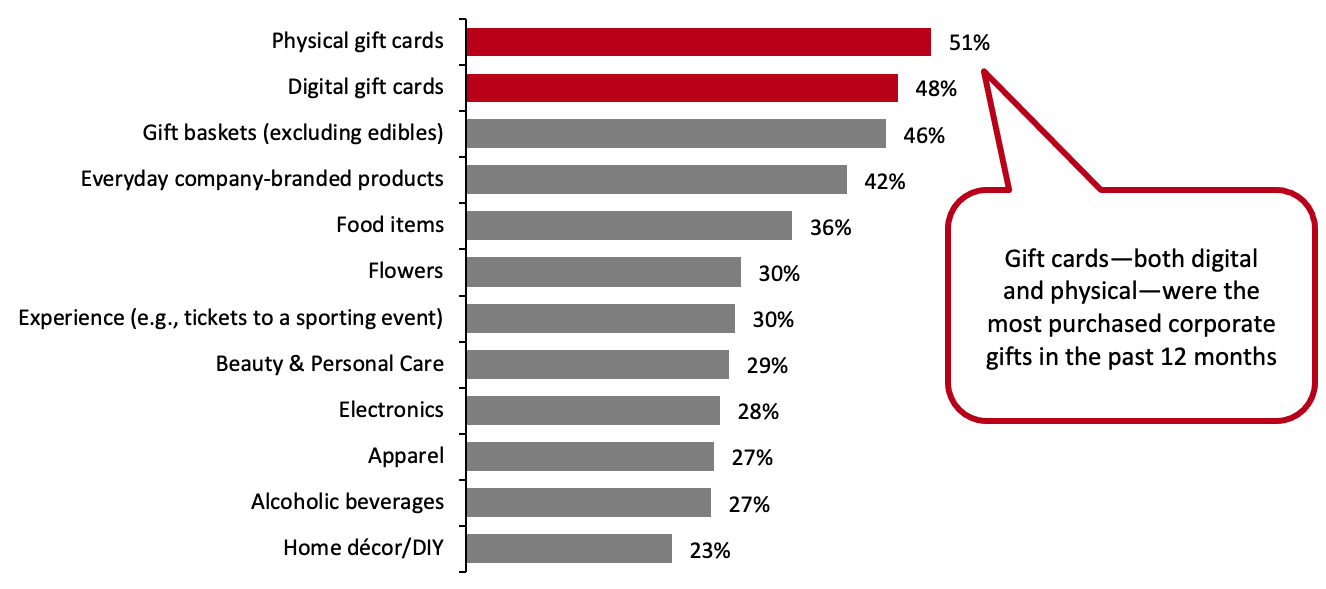 Base: 300 corporate gift givers in the US, surveyed in May 2021
Base: 300 corporate gift givers in the US, surveyed in May 2021Source: Coresight Research[/caption]
Corporate Gifting: Key Insights and the Path Forward
GiftNow, an end-to-end omnichannel gifting solution, is well positioned to help retailers capitalize on opportunities in the corporate gifting market. GiftNow’s Gift Experience Management (GXM) platform offers visual greeting capabilities and the easy exchange and modification of gifts before they are actually shipped, as well as providing gift givers end-to-end visibility of the overall gifting process. In addition, GiftNow enables the gift recipient to provide their preferred shipping address, in turn, solving one of the industry challenges—lack of information on the recipient. This is even more important when gifting to a larger audience such as holiday gifting to employees working remotely or to attendees of a virtual event. Based on our survey analysis, we underline three key recommendations for corporate gift providers to achieve success:- Adding more meaning to gifts by allowing individualized choices can help make the recipient feel valued. Our survey data reveals that gift buyers send out corporate gifts to primarily strengthen their relationship with their employees/clients and with an intention of making the recipient feel valued.
- Innovation in gift cards can help gift givers achieve their primary goal of relationship building. Gift cards are devoid of thought and are very transactional in nature. Adding personalization features to gift cards including innovative digital card approaches such as a personalized video greeting or allowing the recipient to revert using either text or video can substantially transform the recipient’s experience.
- Enabling the recipient to select their gift before it is shipped and providing the ability to track their gifts can substantially improve the overall gifting experience. This will also help address key challenges such as a limited range of products and limited customization options at scale.
Methodology
This study is based on the analysis of data from an online survey of 300 corporate gift buyers in the US. Respondents in the survey satisfied the following criteria:- Company annual revenues of any size (from companies with revenue of under $100 million to those with revenue of over $30 billion)
- Employee count of any number (from companies with under 100 employees to those with over 3,000 employees)
- Industries such as retail, real estate, manufacturing, travel and hospitality and health services among others
- Departments such as administration, operations management, sales and events management, among others